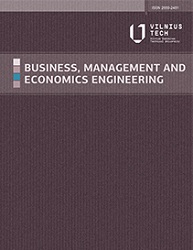AN UNSTOPPABLE AND NAVIGATING JOURNEY TOWARDS DEVELOPMENT REFORM IN COMPLEX FINANCIAL-ECONOMIC SYSTEMS: AN INTERVAL ANALYSIS OF GOVERNMENT EXPENSES (PAST, PRESENT, FUTURE)
AN UNSTOPPABLE AND NAVIGATING JOURNEY TOWARDS DEVELOPMENT REFORM IN COMPLEX FINANCIAL-ECONOMIC SYSTEMS: AN INTERVAL ANALYSIS OF GOVERNMENT EXPENSES (PAST, PRESENT, FUTURE)
Author(s): Enkeleda LulajSubject(s): National Economy, Economic policy, Health and medicine and law, Public Finances, Socio-Economic Research
Published by: Vilnius Gediminas Technical University
Keywords: complex systems; interval analysis; public spending; financial reports and statements; financial and economic reform; past-present-future PPF;
Summary/Abstract: Purpose – The world is facing unprecedented opportunities to improve welfare and reduce poverty, so every day more and more public spending is becoming important in every country. The purpose of the research was prompted by the questions of whether there were development reforms and what is the complexity that has evolved in each variable (WS, GS, EU, ST, CE, and TE) for the time interval 2007–2020. How and are governing bodies able to continuously drive growth for decades by being more efficient users of government spending planning in complex financial and economic systems? Therefore, this paper aims to understand and advance by bringing a new approach to unstoppable and navigating reforms to government spending in complex financial and economic systems. Research methodology – The research was conducted through secondary data from annual financial reports and statements for both central and local levels. The time interval for 14 years was analyzed through two analyses and one matrix such as descriptive analysis (9 tests), correlation analysis (3 tests), and Proximity Matrix (Euclidean Distance between years and variables, Z stress test) as in the Tables (1–12), in the Figures (1–11) using SPSS version 23.0 for Windows. Findings – The findings showed that: a) the data had a normal distribution, b) there was an increase in expenditures for each year, especially in times of pandemic COVID-19, c) the data were obtained from financial reports and statements as well as different institutions over different years, d) there is a strong and positive relationship between the variables for government spending in complex systems, e) Public expenses have increased due to COVID-19 and the damage caused is continuing, affecting the decline in the well-being of the residents. Research limitations – The limitations of this paper are that only a considerable number of variables are studied and only in the state of Kosovo for 14 years (2007–2020). In this case, for other analyses by other researchers’ other variables can be analyzed, more extended periods or comparability with other states. Practical implications – based on the above questions, it was confirmed that there were reforms in the complex financial and economic systems for government expenditures each year. Originality/Value – Such research has not been analyzed before and the findings of this research can help budget experts to accurately plan expenses based on the three periods studied (past, present or the period of the Covid-19 pandemic and the future or the post-COVID-19 pandemic period). It is strongly recommended that governing bodies develop and improve the category of public investment expenditures.
Journal: Business, Management and Economics Engineering
- Issue Year: 20/2022
- Issue No: 2
- Page Range: 329-357
- Page Count: 29
- Language: English

